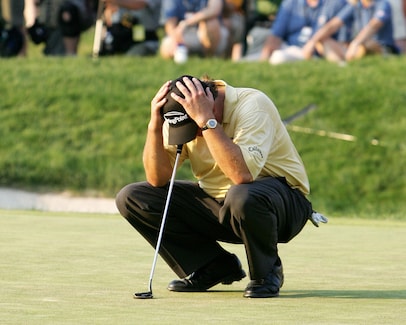With any luck, the July 4 weekend will be the low point of my golf season, because I was awful. Every day, my scores got worse. I pulled my irons, got easily frustrated and wondered if I was wasting my time.
I’m already at the point where I’m glad it happened.
Whether out of delusion or persistence, I have learned to embrace bad golf as an opportunity to address a problem that might otherwise go ignored. It’s one advantage I have over my single-digit and scratch-handicap friends. They play enough decent golf that their risk of “that’s good enough” complacency is real. The benefit of truly sucking is you’re motivated to do something about it.
The latest reinforcement of this concept came via a discussion that had nothing to do with golf. Arthur Brooks is a Harvard professor and social scientist I’ve referenced before. That’s because Brooks is foremost an expert on happiness, which is a helpful perspective when playing a sport that occasionally makes us miserable.
Low Net  Golf Digest Logo You should practice being annoyed
Golf Digest Logo You should practice being annoyed  Golf Digest Logo What really happens when you ‘find something’
Golf Digest Logo What really happens when you ‘find something’  Golf Digest Logo The stat that points to the quickest improvement? Strokes Lost Stupid
Golf Digest Logo The stat that points to the quickest improvement? Strokes Lost Stupid
In a guest appearance on Rich Roll’s podcast, Brooks describes an exercise in his Harvard Business School happiness class in which he asks students to address specific disappointments.
First, he asks students to write down the episode on a line in a notebook and to leave the next two lines blank. A month later, Brooks asks students to return to their notebook and write on the next line something they ended up learning from the negative experience. Then, three months later, they’re asked to go back again and fill out the third line with something good that stemmed from the original event. Eventually, the students come away with a full notebook, and something even more valuable.

“By the time you’re going to a new thing that’s really bothering you, you start to look forward to it because you’re going to be looking back at the knowledge and growth from past negative experiences and the benefit that it actually has come from those negative experiences,” Brooks explains.
At this point, you might be skeptical. If I just got done with a terrible round, am I really supposed to be skipping in the door? Not exactly. Brooks isn’t suggesting students should be happy when things go poorly. “That’s not the way life works,” he says. But the exercise asks us to leave space for the possibility that these stumbling blocks still yield benefits.
They usually do, even if not how we expect. For instance, in the aftermath of my lost golf weekend, I was annoyed enough to schedule time with my teacher; if I were to write this all down in one of Brooks’ notebooks, I could note that I learned that my head was moving too much on the takeaway, something I hadn’t even thought about before. That I played much better the following weekend was one immediate victory, but that trend is fleeting. More important was a deeper understanding of my golf swing and my tendencies.
And by the way, not every difficult pocket needs to lead to a dramatic correction. The Golf Digest Top 50 teacher Tony Ruggiero says when players hit a slump, he’s just as inclined to emphasize patience. In those instances, the positive outcome might be recognizing an ability to weather a challenge, and not overreact.
“I think when players hit a slump or play poorly, the first thing you have to do is look big picture,” Ruggiero said. “It might be an outlier, and you need to reinforce that. Prove to them what they did and get them to believe in it again.”
True, it’s always easier to play better, if only because you don’t have to go through the exercise of determining what is worth responding to and what isn’t. Brooks recognizes we’ll always prefer the positive outcomes. Yet the best way to handle the alternative is to allow those to be fruitful as well.
“What you find is that real masters in this, they’ll wake up in the morning and they’ll say, ‘I’m really grateful for all the wonderful, beautiful, generative things that are gonna happen today. And I’m also really grateful for the things I don’t like today because I know retrospectively that that is gonna be the source of my growth,’” Brooks says.
This article first appeared in Low Net, a Golf Digest+ exclusive newsletter written for the average golfer, by an average golfer. To get Low Net directly in your inbox, sign up for Golf Digest+ here. Have a topic you want me to explore? Send me an email and I’ll do my best to dive in.
This article was originally published on golfdigest.com




